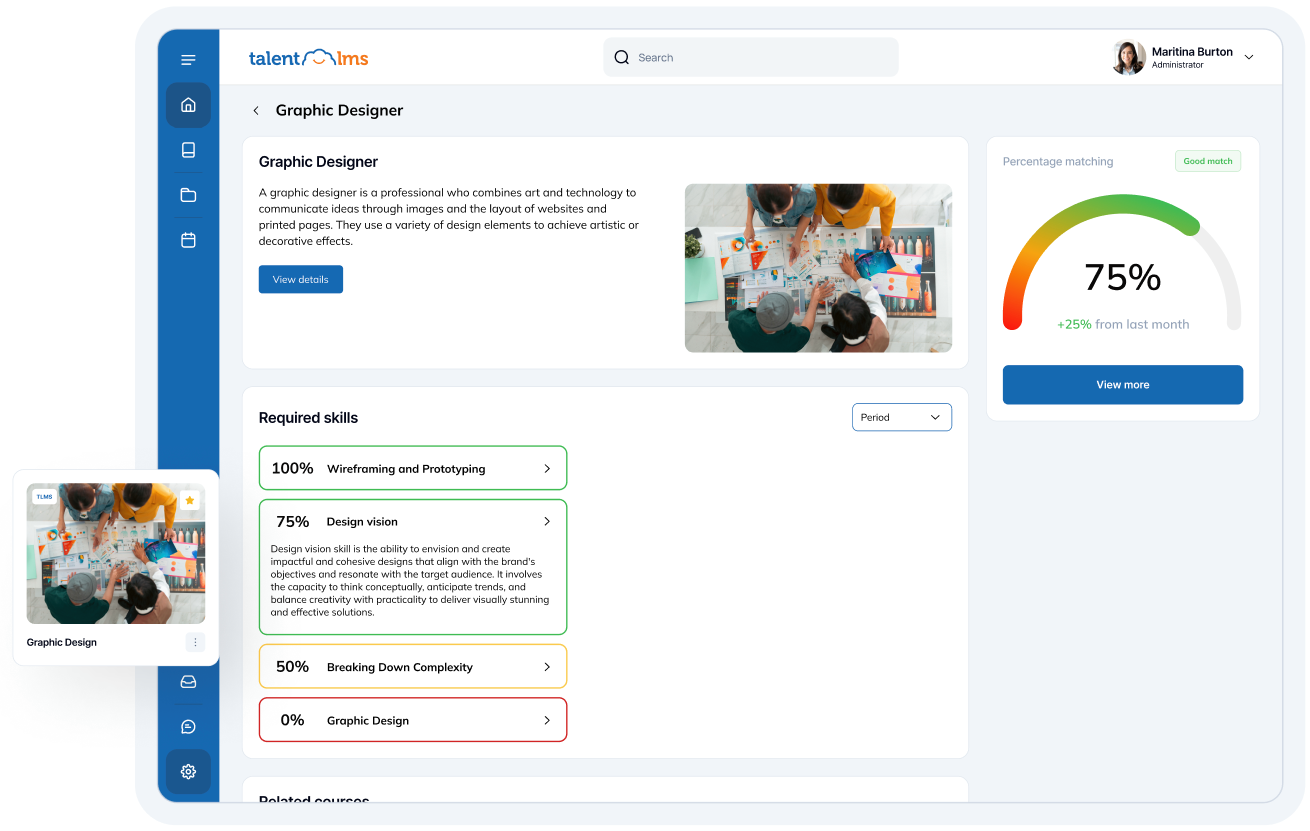
Online learning platforms have transformed personal and professional growth. eLearning platforms have made upskilling and reskilling more accessible than ever, allowing individuals to expand existing skill sets or shift to brand-new careers more easily.
They’ve also made meaningful, continued online training more accessible for organizations of all sizes and industries. This means online learning platforms present employers with exciting new training opportunities.
With so many great choices out there, how do you pick the perfect platform? Let’s take a closer look at the best online learning platforms in 2025 and their features. We’ll also examine the perks of using them and how to choose the ideal tool for your unique training needs.
Why should you be using online learning platforms?
Self-paced learning
Self-paced training ensures that your people learn based on their schedules. And employee training LMS solutions go even further compared to traditional online learning platforms. They allow employers to access learner progress insights, introduce blended learning activities and more. Combined, these features empower learners to engage in training at their own pace in pursuit of their career goals, leading to more successful training as a result.
Cost-efficiency
As your organization grows, deploying cost-effective training will allow you to scale consistently. By having users log in to complete their online courses from anywhere and at any time, you’ll also eliminate the costs associated with in-person training. The best eLearning platforms scale alongside you, allowing you to train as many or as few users as you need at a time. Ensuring your learners are up-to-date on the latest knowledge, skills, or compliance training can be costly without a reliable solution.
Diversity of training content
Online learning platforms allow you to share a wide variety of course materials with your learners instantly and across great distances. Content such as short videos, various PDFs and presentations, interactive assessments, and other engaging materials can enrich your online courses, leading to more successful learning outcomes.
Certification opportunities
Certifying your employees mitigates business risks through compliance training and ensures they’re aligned with industry best practices. With dedicated learning platforms, employees can complete their assigned online courses and seamlessly receive their certificates. By using reliable eLearning solutions, you can also customize your certificates, reassign courses over time, and ensure your employees are always on top of their training.
What types of training can online learning platforms be used for?
Onboarding training
Effectively bringing employees up to speed on responsibilities and processes will set the foundations for the remainder of their tenure with your company. Online learning platforms can be used to share the relevant training with your new hires from day one. And once they’ve completed their onboarding, they can smoothly transition into an ongoing learning experience based on their roles and acquire new skills, all within the same training ecosystem.
Employee training
Continuously training your employees will ensure they always have the know-how to tackle current challenges and succeed in a modern workplace. Online learning platforms allow you to separate learners into different groups based on their roles, departments, and other factors. You can then effortlessly assign courses for all your professional development programs to ensure smooth employee training for everyone in your company.
Customer and partner training
Depending on the type of product or service you offer, you may want to train your customers and partners on how to properly use your digital products, resell them, or otherwise make the most of them. Online learning platforms enable you to conveniently create specific courses for each of your products or services. And with some of the best company LMS solutions out there, your LMS provider will ensure your courses are available for anyone to access online 24/7, thanks to reliable hosting.
Distributed workforce training
Online learning platforms are ideal for training a distributed workforce through remote learning programs. They effectively standardize training across the organization, regardless of working arrangements, geographic location, or time zone, all with just a stable internet connection. It’s why an online learning platform can help you deploy self-paced training that anyone can pick up and finish on their own time, regardless of where they are.
Compliance training
Compliance training is a must in various industries, including healthcare, construction, finance, and others. Given its importance, you’ll want to deploy it and certify your employees as efficiently as possible. With reliable employee training software to share your courses on, you can also keep track of which employees completed their online courses and when. You can also ensure others follow suit with reminders, notifications, and other features.
Start training with 1000+ certified courses
What’s the difference between a learning management system (LMS) and an online learning platform?
To understand which kind of learning tool would best suit your organization, let’s take a look at the key differences between learning management systems (LMS) and online learning platforms. They are fundamentally different and allow you to approach training in unique ways, so let’s take a closer look at both.
Learning management system (LMS)
An LMS is a cloud-based eLearning software solution that allows you to create, manage, deliver, and assess training. An LMS is a highly customizable training solution that integrates with your existing Customer Relationship Management (CRM), Human Resource Information System (HRIS), and other tools. White labeling, report customization, certification, and automated training assignments are only some of the features the best LMS solutions can offer.
Online learning platform
Online learning platforms are web-based solutions that offer ready-made libraries of courses. They allow you to acquire courses individually, per license, or in bulk, as a subscription. You can also try out free online learning platforms to test the waters before you commit to any one solution. However, free courses may not meet your criteria when it comes to highly specialized training.
They also lack the in-depth training progress assessments and learner engagement features of LMSs. The upside of using them is that most integrate with LMSs, meaning that you can combine their courses with a suitable solution for more effective training.
Which is right for you?
An LMS is a better choice if you want to create a tailored training program and manage a comprehensive employee learning experience. However, if you want quick access to a variety of courses without in-depth customization or progress tracking for one-off training, an online learning platform might be more suitable. And for organizations looking to combine custom training and ready-made content, there are a number of LMS solutions that integrate with online learning platforms to offer the best of both worlds.
Top 12 online learning platforms for 2025
1. TalentLMS
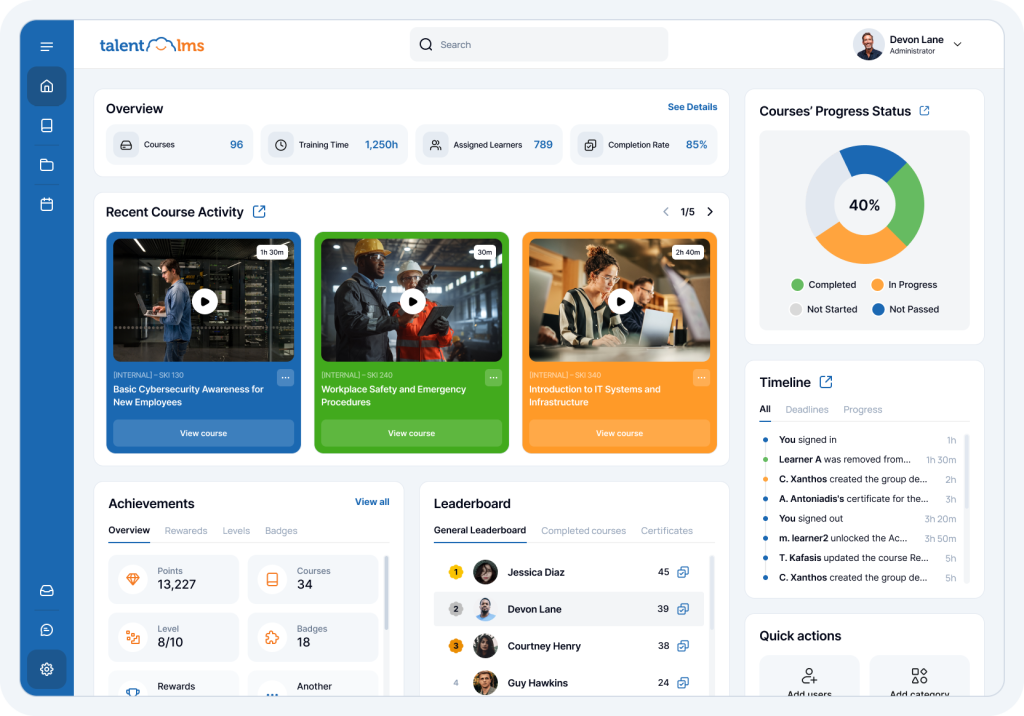
Rating: 4.6/5 (738 reviews)
TalentLMS is a cloud-based LMS built for small-to-midsize businesses (SMBs) looking to train employees, customers, and partners. As an online learning platform, it features intuitive AI functionality that makes creating and deploying effective training seamless for both experienced and first-time LMS users.
TalentLMS’s AI course creator allows you to generate interactive courses within minutes from scratch. Its skills-based learning tool also lets you map your learners’ skill sets and empower their continued growth. Beyond artificial intelligence, its features minimize manual training admin thanks to automated training assignments, scheduled reports, customizable notifications, and more.
TalentLMS’s library of 1000+ certified courses also makes it easy for you to deploy onboarding, sales, compliance awareness, and soft-skills training with unlimited access and without looking for other course providers. All of these features, paired with its enhanced interface, make TalentLMS one of the best online learning platforms for growing businesses.
Key features
- AI course creator
- AI skill-based learning
- Training portal white labeling
- Learning gamification
- Instructor-Led Training (ILT)
- Learner certification
- SCORM-compliant
- Branches (Subdomains)
- Third-party integrations
- Admin automations
- Customizable reports and analytics
TalentLMS Overview
- Best used for: Small-midsize business (SMB) training, employee onboarding and training, customer and partner training, compliance training
- Not the best fit for: Academic learning, selling courses
- Pricing: Free plan available. Pricing starts at $89/month (Core Plan), $229/month (Grow Plan), and $309/month (Pro Plan).
2. Coursera
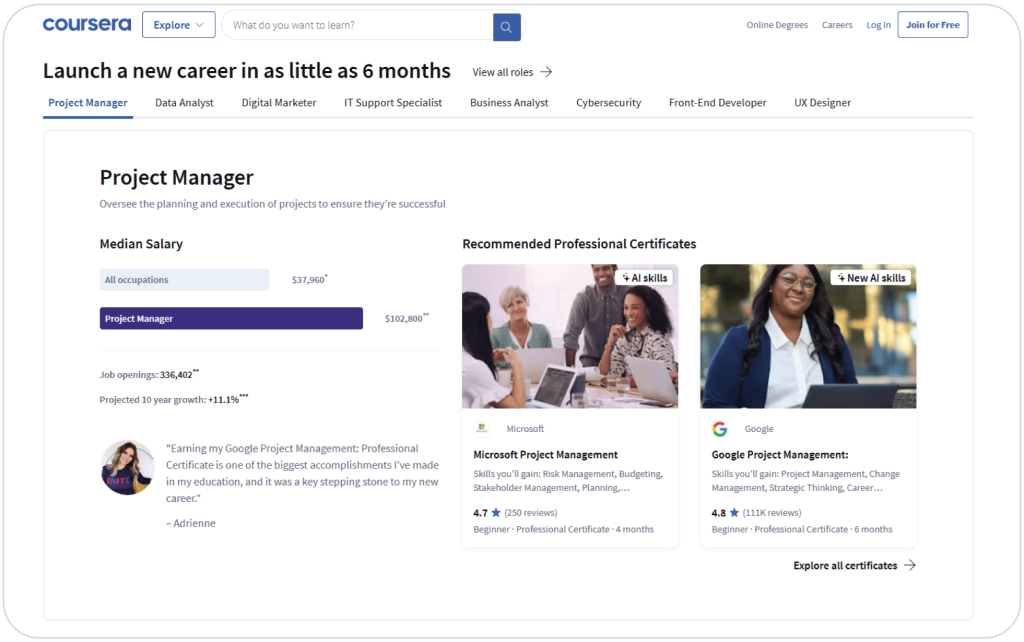
Rating: 4.5/5 (434 reviews)
Coursera is an online learning platform that provides individuals and businesses with courses that specialize in a diverse range of industries. The Coursera catalog features university courses from various top universities and companies that are leaders in their respective fields, such as Google, IBM, and Stanford University.
Coursera for Business lets you train multiple employees at once through courses made up of video lessons, assessments, and other types of content. The platform features certified training, meaning that your learners will get certified in various hard, soft, and creative skills as they complete their courses. And with functionality such as peer grading and interactive exercises and assessments, Coursera is a good choice for your people’s upskilling.
Key features
- 10,000+ courses
- Certified training
- Ability to get courses individually or as a subscription
- Interactive exercises
- Free & paid training
- Peer grading
- Mobile learning
- Course recommendations
- Offline access
- Discussion forums
Coursera Overview
- Best used for: Certified training, basic employee training, academic learning
- Not the best fit for: Compliance training, in-depth, role-specific training
- Pricing: Free courses available. Pricing starts at $9.99/course for non-certified training and $39/course for certified training. Monthly and annual subscriptions are also available.
3. Udemy
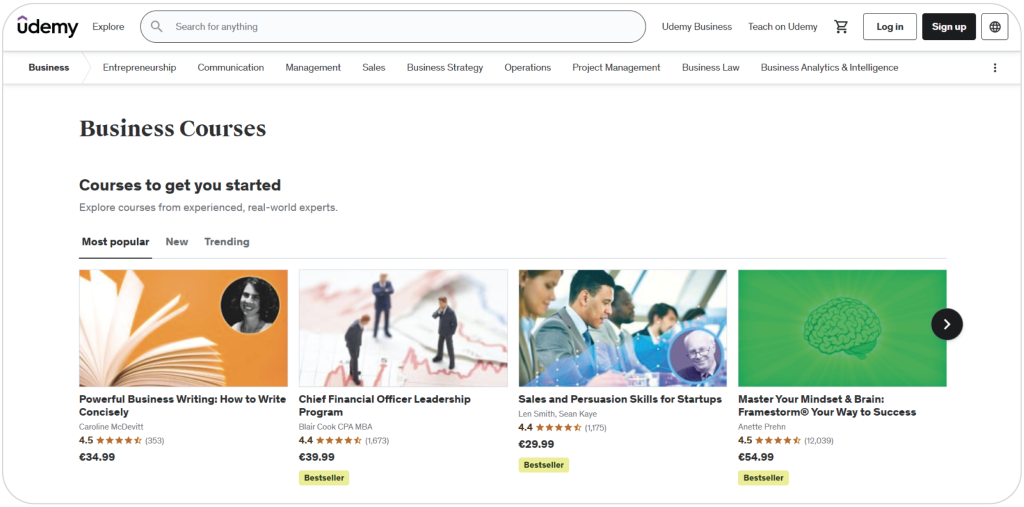
Rating: 4.5/5 (602 reviews)
Udemy is one of the online learning platforms with the largest selection of courses available. Thanks to the platform’s eCommerce features, anyone can publish their courses on Udemy and sell them. However, this makes Udemy less suited for highly specific training and more appropriate for introductions to various skills and industries.
Udemy Business is Udemy’s subscription program that allows organizations to access a curated collection of high-quality courses. This allows employees to prepare for industry-recognized professional certificate processes, practice their skills in controlled sandbox environments, and more. This makes Udemy a worthy tool for junior professionals looking for introductory-level training.
Key features
- 250,000+ courses
- Certified training
- Ability to get courses individually or as a subscription
- Learning path customization
- Community features
- Interactive exercises
- Mobile learning
- Downloadable resources
- Course recommendations
- eCommerce functionality
Udemy Overview
- Best used for: Basic employee training, certified training, academic learning, selling courses
- Not the best fit for: Compliance training, in-depth, role-specific training
- Pricing: Free courses available. Paid courses start at $10/course and $11/month for access to a curated selection of courses (Personal Plan).
4. LinkedIn Learning
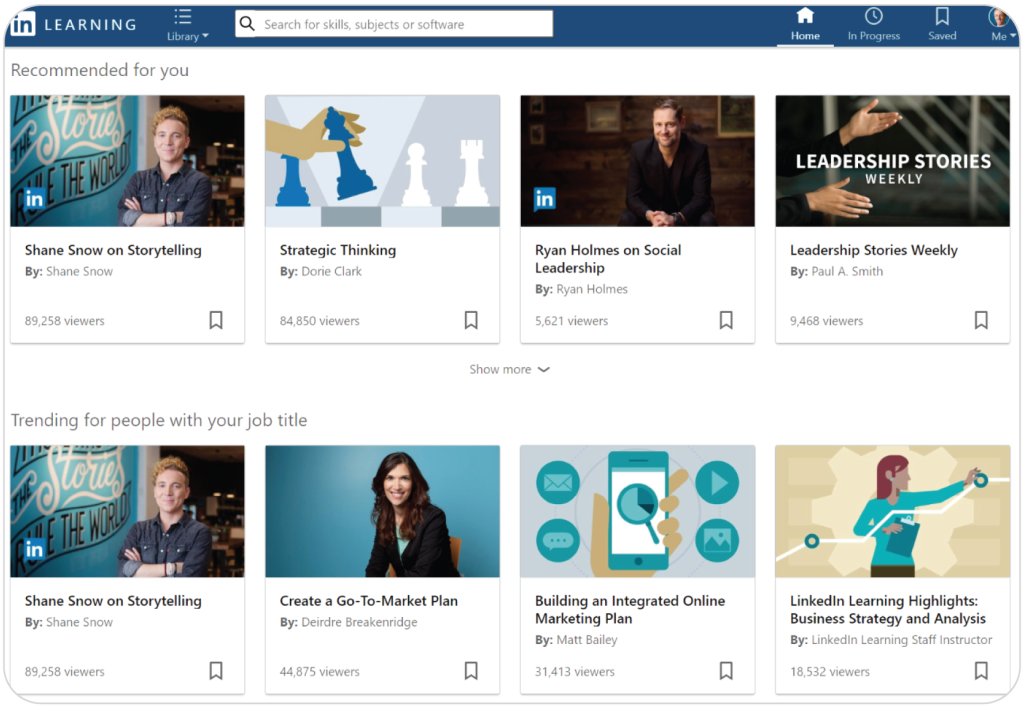
Rating: 4.4/5 (681 reviews)
LinkedIn Learning is a part of LinkedIn, the global business and employment social media platform. This makes it one of the more unique online learning platforms, as it allows individuals to conveniently share professional certificate acquisitions and network with other learners.
However, compared to LMSs, LinkedIn Learning lacks notable learner management capabilities. While it allows users to set learning goals to track their progress, it doesn’t have the same reporting capabilities as a dedicated LMS. Although it features high-quality courses, the selection may feel limited depending on your industry and the skills you want to develop.
Key features
- 22,000+ courses
- Ability to get courses individually or as a subscription
- Certified training
- Interactive exercises
- Learning goals
- Learning path customization
- Social learning
- Course recommendations
LinkedIn Learning Overview
- Best used for: In-depth, role-specific training, employee training
- Not the best fit for: Academic learning, compliance training
- Pricing: Free trial available. Paid courses start at $20/user/course and $39.99/user/month for access to the full course library.
5. EdX
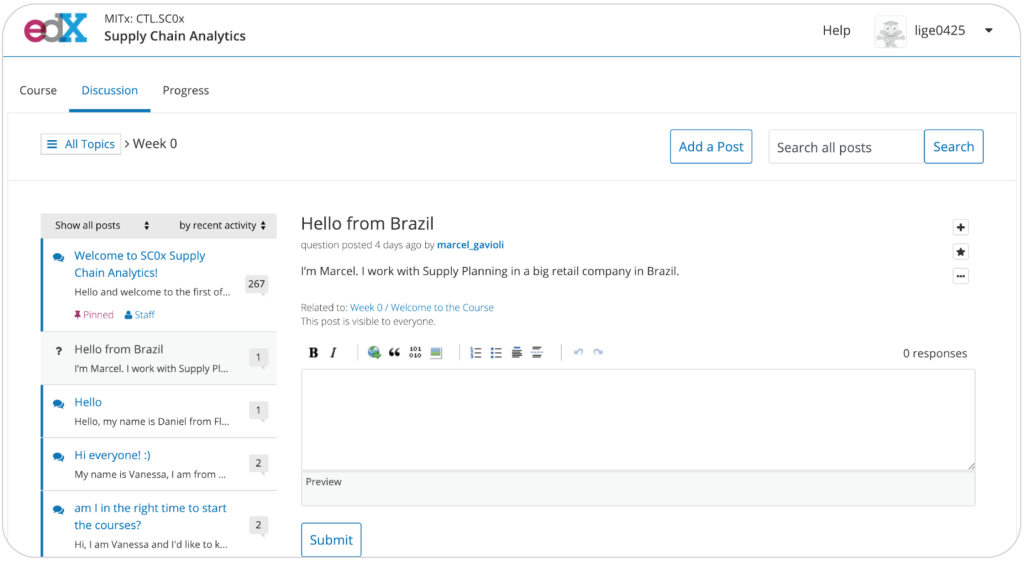
Rating: 4.5/5 (118 reviews)
EdX is an online learning platform with a library of courses geared toward leadership development. Whether you’d like to set up training for your future leaders or upskill managers and executives in your organization, EdX will cover your needs. It features courses from top universities such as MIT, Harvard University, Berkeley, and other prestigious higher education establishments with dedicated degree programs.
This means EdX offers undergraduate, Master’s, and doctoral degree programs as part of its course lineup. Its built-in community features allow learners to connect with alumni who already completed the individual courses they’re currently enrolled in. While it’s not one of the online learning platforms best suited for standard employee training, it’s a good choice if you’re focused on developing current and future leaders’ skill sets.
Key features
- 4,000+ courses
- Certified training
- Ability to get courses individually or as a subscription
- Learning path customization
- Reports and analytics
- Single sign-on (SSO) integration
- Community features
- eCommerce functionality
EdX Overview
- Best used for: Leadership development, academic learning
- Not the best fit for: Employee training, selling courses
- Pricing: Free courses available. Paid courses start at $90/course and $359/user/year (Enterprise Plans with access to the full course library).
6. Pluralsight
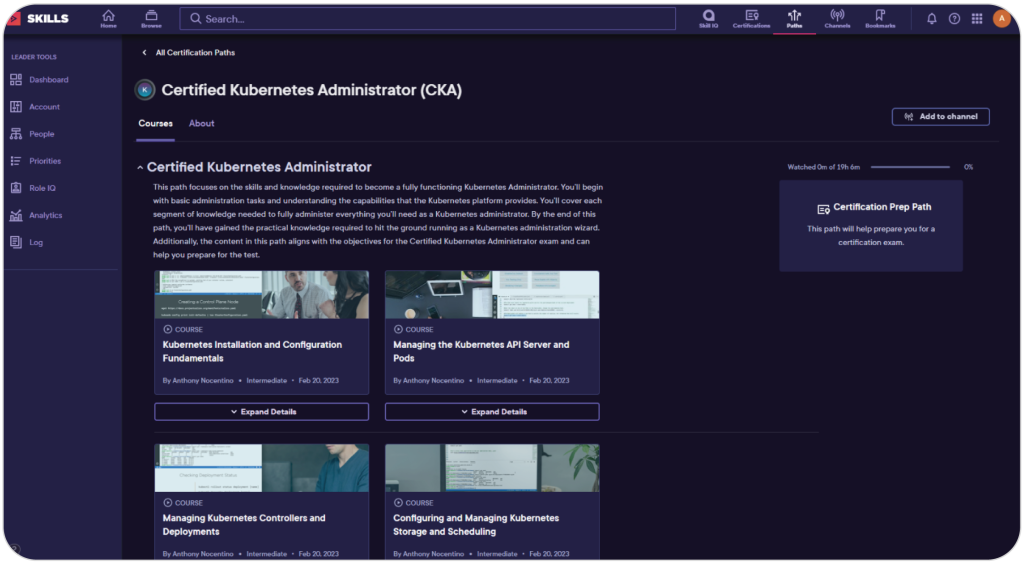
Rating: 4.6/5 (1,027 reviews)
Pluralsight is an online learning platform built around upskilling in the IT industry. It features dedicated courses for cloud-based systems and software development, allowing professionals to stay up to date on the latest technologies. While it doesn’t have built-in certification, Pluralsight’s content is based on industry best practices.
Learners can try out what they’ve learned within sandboxes, controlled virtual environments made for software development. This allows professionals to take Pluralsight’s courses in preparation for professional certificate acquisition by organizations like Microsoft, Amazon, and others. Pluralsight is among the top online learning platforms for IT upskilling specifically. However, that makes it less suitable for other types of training with courses focused on programming, math, and various software development processes.
Key features
- 7,000+ courses
- Certification practice exams
- Reports and analytics
- Curated learning paths
- Interactive learning in sandbox environments
- Single sign-on (SSO) integration
- Mobile learning
Pluralsight Overview
- Best used for: IT professional upskilling, employee training
- Not the best fit for: Academic learning, compliance training
- Pricing: Free trial available. Paid courses start at $26/user/month (Standard Plan with a limited library of courses) and $369/user/year (Starter Plan with access to the full course library).
7. Skilljar
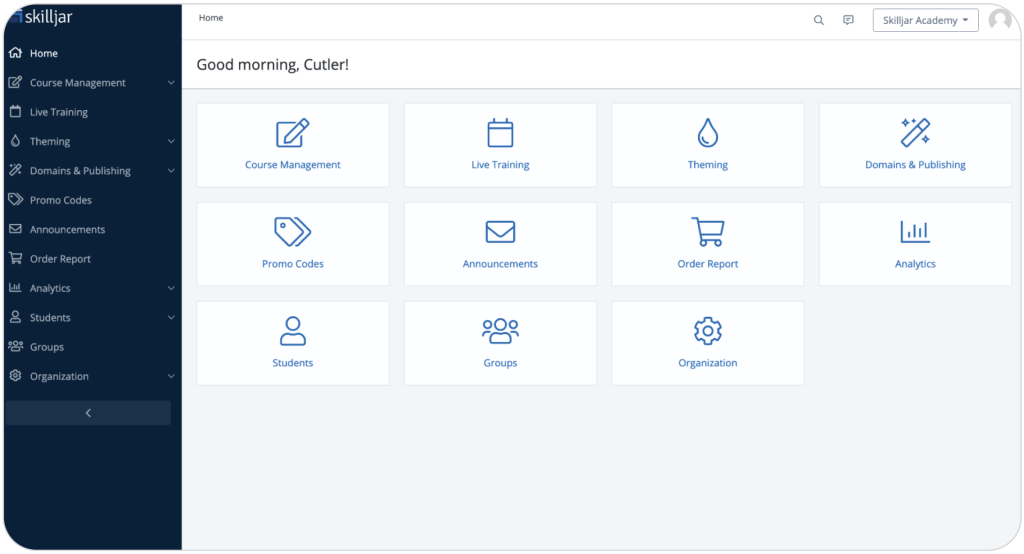
Rating: 4.6/5 (210 reviews)
Skilljar is an online learning platform for customer and partner training. It has built-in content creation features and allows instructors to set up automated course assignments. What makes Skilljar unique is that it allows users to create multiple eLearning websites for different audiences.
These sites can be fully customized and feature their own courses. Skilljar also has extensive eCommerce functionality, which further expands its use to train individuals looking for specific courses. While it’s one of the most suitable solutions for external training, this makes it less suitable for employee training.
Key features
- Course creator
- Training portal white labeling
- Certificate customization
- Instructor-led training (ILT) sessions
- Training management automations
- Reports and analytics
- Single sign-on (SSO) integration
- SCORM-compliant
- eCommerce functionality
Skilljar Overview
- Best used for: Customer and partner training, selling courses
- Not the best fit for: Employee training, academic learning
- Pricing: No free trial available. No price listed. Contacting the vendor is required.
8. SC Training (formerly EdApp)
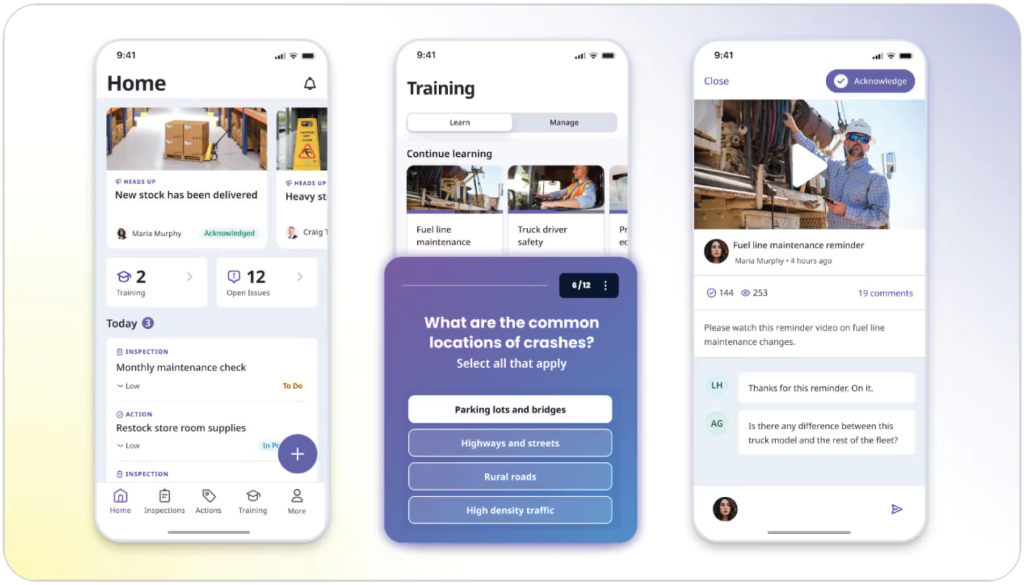
Rating: 4.7/5 (219 reviews)
SC Training differs from other online learning platforms as it’s a mobile-first solution. It allows learners to access all of their courses and for managers to easily access learner activity metrics on the go.
SC Training features learning content creation that enables instructors to deploy the kind of courses they need without looking for additional learning platforms online to get their training materials. As a mobile-first platform, it relies on gamification to enrich the learning experience and get users to complete courses on time. Paired with a focus on short-form courses, it’s a convenient but limited solution for mobile training.
Key features
- Course creator
- AI-powered content translation
- Mobile learning
- Microlearning
- Course template library
- Reports and analytics
- Learning gamification
- Social learning
- Blended learning
SC Training Overview
- Best used for: Mobile training, small business training, compliance training
- Not the best fit for: Academic learning, government-level training
- Pricing: Free plan available. Pricing starts at $5 per learner (Premium Plan).
9. Moodle
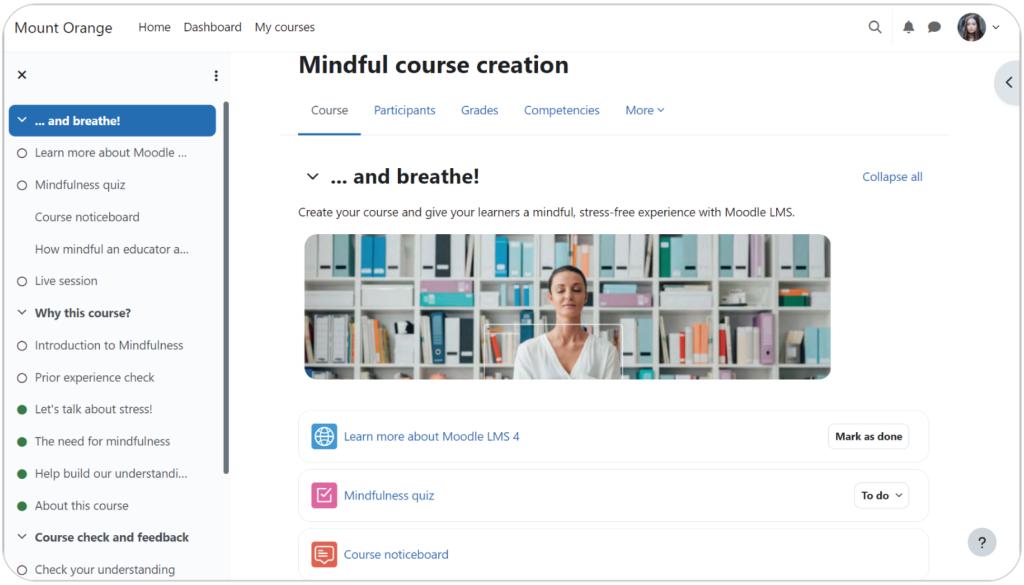
Rating: 4.1/5 (414 reviews)
Moodle is one of the most popular open-source online learning platforms. It was developed by a global community of programmers who are passionate about eLearning. New features and improvements come from community-led projects, which can then be used as plugins in your own training portal.
Moodle is one of the free online learning platforms widely used to assess students in academic institutions worldwide. Due to being open-source, it is less user-friendly than most solutions out there because you’ll need an IT professional to help you set it up. Once it’s up and running, however, Moodle allows you to track learners’ progress, manage social learning elements, and integrate it with other tools in your organization.
Key features
- Open-source license
- Training portal white labeling
- Third-party integrations
- Learning plans
- Learner progress tracking
- Customizable reports
- Social learning
- Learning gamification
- Accessibility checker
Moodle Overview
- Best used for: Academic learning
- Not the best fit for: Employee training
- Pricing: Free plan available. Pricing starts at $130/year for up to 50 users.
10. 360Learning
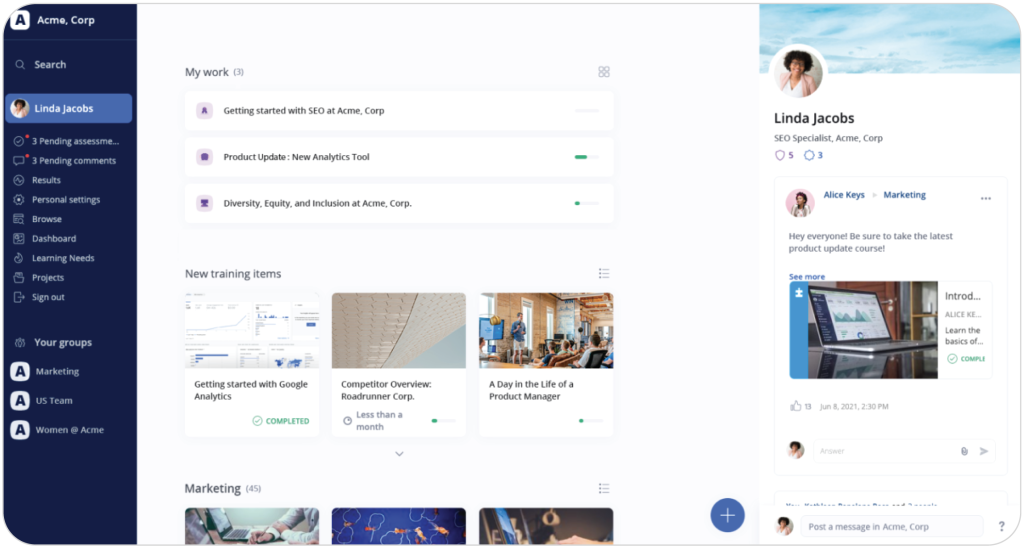
Rating: 4.6/5 (424 reviews)
360Learning is an online learning platform designed for organizations looking for collaborative learning features. This means that most of its functionality is built around learner interaction and collaboration. 360Learning includes content creation, as well as its assignment into different projects and tasks based on learning goals.
Designed with collaborative learning in mind, this eLearning platform offers features like discussion forums, Instructor-Led Training (ILT), and diverse assignment options. However, its focus on this training approach means it might not be the ideal fit for every learning scenario or specific needs.
Key features
- Course creator
- AI prompt customization
- Project and task management
- Customizable notifications
- Training portal white labeling
- Learning gamification
- Collaborative learning
- Resource library management
- Discussion forums
360Learning Overview
- Best used for: Collaborative learning, employee training, customer and partner training
- Not the best fit for: Enterprise-level training, academic learning
- Pricing: Free trial available. Pricing starts at $8/user/month (Team Plan).
11. Docebo
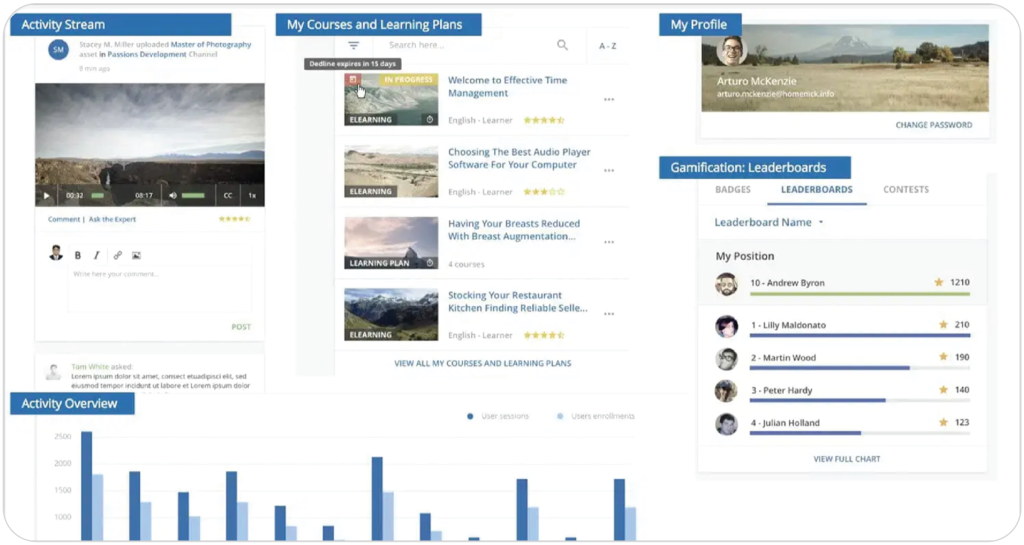
Rating: 4.3/5 (646 reviews)
Docebo is an online learning platform built for enterprise-level training. It features AI-driven learning content suggestions, social learning options, and gamification. Docebo integrates with over 400 external systems, making it a viable choice for organizations that already rely on several other tools.
Analytics and reporting are available for tracking learning progress and activity, and instructors can utilize Docebo’s AI suggestions on how to improve each learner’s experience. It’s one of the online learning platforms geared toward large-scale organizations with long-term training in mind, which makes it less suitable for SMBs and seasonal training.
Key features
- AI-guided learning
- Learning gamification
- Mobile learning
- Social learning
- Ready-made content library
- Third-party integrations
- Learner certification
- SCORM-compliant
- Reports
- eCommerce functionality
Docebo Overview
- Best used for: Enterprise-level training, government-level training, employee onboarding and training, customer and partner training, compliance training
- Not the best fit for: Small business training, academic learning
- Pricing: No price listed. Contacting the vendor is required for a free trial.
12. LearnUpon
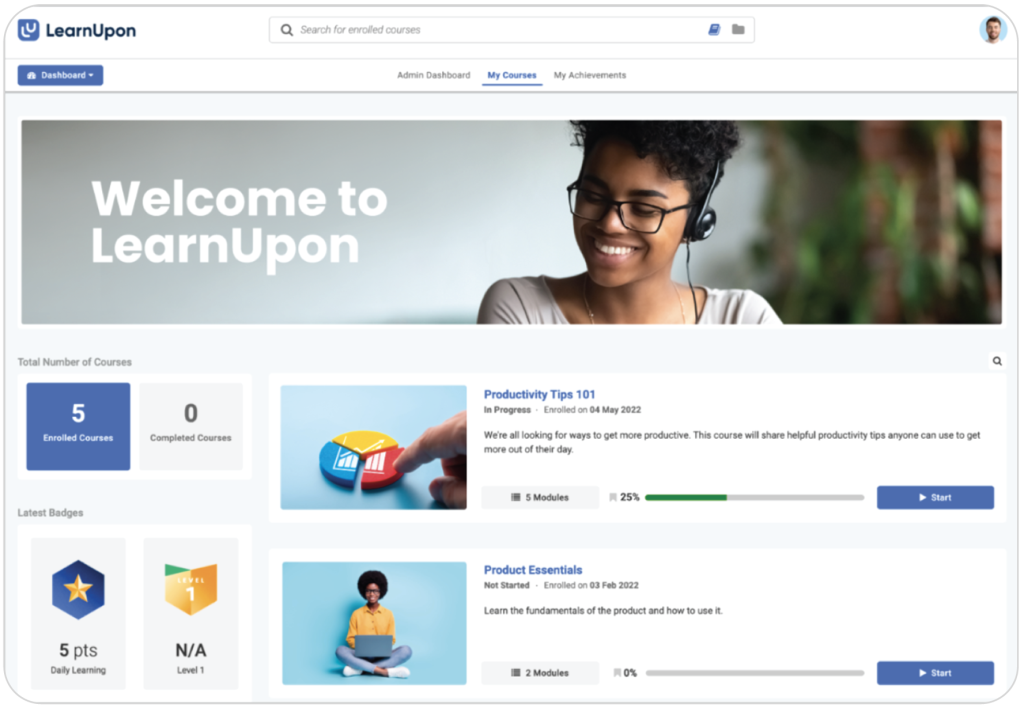
Rating: 4.6/5 (158 reviews)
LearnUpon is an online learning platform designed for businesses to manage their online training programs. It caters to both employee and customer training and offers features such as course authoring, reporting, and multiple learning portals.
LearnUpon also comes with eCommerce functionality, allowing you to create individual portals to sell your courses. While this makes it an all-around type of eLearning tool, its scope may be too wide for SMBs looking for a straightforward training solution. Its customization is also lacking compared to other online learning platforms, so it comes down to what you’re looking for in a training tool.
Key features
- Course creator
- Training management automation
- AI-powered learning
- Personalized learning
- Training surveys
- Learning gamification
- Portals (subdomains)
- Reports and analytics
- eCommerce functionality
LearnUpon Overview
- Best used for: Employee training, external training, selling courses
- Not the best fit for: Academic learning, small business training
- Pricing: Free trial available. No price listed. Contacting the vendor is required.
What are the challenges of using an online learning platform?
Updating your courses over time
Once you’ve set up your platform and shared your courses with learners, you’ll need to make sure your content is up-to-date. Trends change, and innovation follows suit. This means you should look for solutions that allow you to conveniently update courses with intuitive course creation tools. For example, TalentLMS’s AI course creator ensures your instructors can easily refine, expand, and otherwise update your course content.
Keeping learners actively engaged
Distractions are all around us, and your learning tools should provide you with features that ensure your learners are engaged in their training. Gamification features can go a long way in hooking your learners and helping them bridge the short attention span gap. Beyond that, the top online learning platforms also let you use notifications to inform learners of upcoming deadlines, due assignments, or Instructor-Led Training (ILT) sessions.
Getting actionable insights on learners’ progress
As your learners start completing courses, you’ll want to know how they’re doing. This will help you understand whether your courses need updating or if certain learners need extra time or additional resources to finish their training. Solutions such as LMSs with customizable reports will allow you to dig deep into visualized training data to find out exactly what you can do to empower your learners.
How to choose the best online learning platform
With all the information now in your hands, you’d think that choosing the best should be straightforward. However, it’s anything but. And with so many unique tools available on the market, you’ll want to be sure you’ve picked the right one.
Here are a few helpful questions you can answer to come up with a short list of the best candidates as you look for the right platform:
- Who do you plan to train (employees, customers, partners, etc.)?
- How many users do you plan to train?
- Are you looking for solutions with AI course creation features?
- Do you plan to adopt a skills-based learning approach to training?
- Do you need a certified library of ready-made courses with unlimited access?
- Which integrations do you need in your eLearning platform?
- Are you looking for online learning platforms that allow you to create a free account?
- What does your eLearning budget look like?
As you gradually answer these questions, you’ll be ready to contact vendors and their sales representatives to discover the best pricing model for your organization. They’re your best resource for specifics and understanding how each platform fits your organization’s training.
What’s the best online learning platform in 2025?
There’s no clear-cut answer to this question. There are many solutions out there that offer great selections of features and courses. Start by creating a list of the ideal features and courses you’d like to deploy as part of your training program.
Then, go through our list of the best online learning platforms and compare them to your requirements. While it may take a bit of time to discover your perfect fit, it’ll be worth it in the long run and reflected in your training program’s success.
The post Top 12 Online Learning Platforms for 2025 appeared first on TalentLMS Blog.



